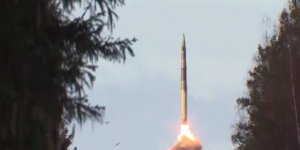
Debalina Ghoshal is a Research Fellow with the Centre for Human Security Studies, Hyderabad
In February 2017, Jane’s revealed that Turkey’s state owned weapons manufacturing company, Roketsan, was developing long range Bora ballistic missiles. To all but the closest Turkey-watcher, this seems odd given that Turkey currently possesses only short range ballistic missiles (SRBMs), such as the MGM140A Army Tactical Missiles (ATACMs) (range of 165kms), the J-600T Yildirim I and II (range of 150 and 300kms range respectively). However, in 2011, the Turkish state scientific research institute, the Tubitak stated that Turkey would develop missiles with ranges of 800kms, 1500kms and 2500kms.
In the past, missiles with such ranges, 2500kms especially, did not seem necessary given Turkey’s geostrategic situation, even when you account for the fact that Turkey’s threats are not just confined to states in the region, but also non-state actors such as Daesh. A Turkish missile with the range of 1000-1500kms can target Damascus, Tehran, Tel Aviv and Cairo as well as all of Daesh’s territory, to name a few.
Turkey’s neighborhood comprises many states with which the country does not share very cordial relations. These include Israel, Syria and Iran to name a few. Israel’s long range ballistic missiles like the Jericho category missiles are also capable of carrying nuclear warheads. Syria on the other hand, possesses the liquid-fuelled Scud category missiles while Iran is progressing with its Shahab and the Sejjil ballistic missiles, as well as its nuclear-capable cruise missile program such as the Soumar. The Iranian developments are particularly relevant as veteran journalist, Burak Bekdil points out, Turkey’s missile program matured during the Turco-Persian rivalry starting in 2011.
In addition, both Israel and Iran possess solid-fuel propelled missiles – easier to prepare, not requiring much launch time and therefore less susceptible to enemy surveillance and detection – which increases their survivability.
Underpinning these developments is the fact that Turkey’s current leadership appears to want to project the power of a regional hegemon. Ballistic missiles are weapons that enhance a country’s power and prestige and this would be complemented by an in development Turkish air defence system. It is worth noting that Turkey is also a host to the US European Phase Adaptive Approach (EPAA). The EPAA is an initiative of the United States to field missile defence system in NATO countries like Romania and Poland along with missile defence radar in Turkey.
While it’s unclear as to whether Turkey’s indigenous missile defence system will be integrated with the NATO missile defence system, missile defence alone cannot achieve regional dominance. Turkey appears to have figured that out. This is proved when in 2016 Turkey’s procurement official, Ismail Demir, expressed its concern that it is “difficult for a country to be deterrent with defensive missiles only.”
That said, NATO in 2016 itself was not happy when Turkey decided to develop long range ballistic missiles. A NATO ambassador had expressed concern in 2016 that “Turkey is a part of security umbrella (of the NATO under Article V of the Washington Treaty). We are not sure if any Turkish effort for offensive missiles makes strategic sense.” There is little doubt that NATO countries would be concerned with Turkey’s continued development of offensive missile systems.
However, for Turkey, post the failed coup, its faith in NATO, especially the US has diminished. Given this change, it will be interesting to see how Turkey manages to maintain peace with NATO as it develops regional and strategic capabilities. On the other hand, it would also be interesting to see how NATO, especially the United States handles the issue of Turkey’s long range missile systems, especially at a time when Turkey’s relations with Russia are warming.